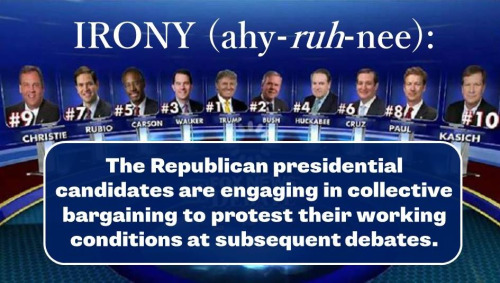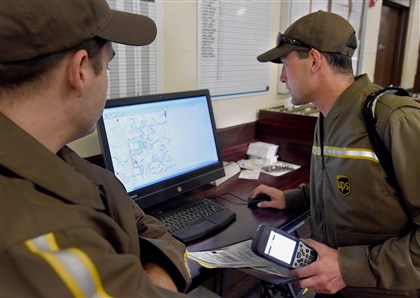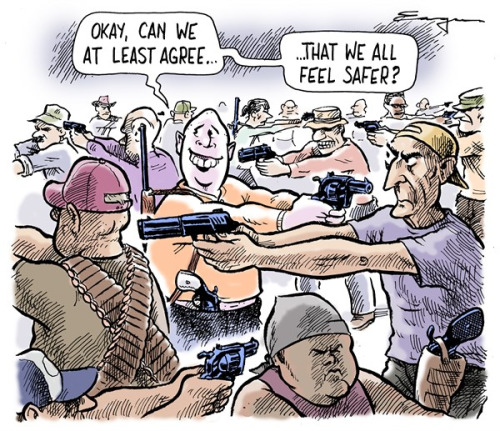Monthly Archives: November 2015
Think again
Irony
Is this you?
UPS and FedEx try every tech trick to speed up deliveries
Delivery Information Acquisition Devices (DIAD) in hand, UPS drivers check the computer depiction of their routes before leaving on the day’s deliveries at the UPS depot in Jackson, Butler County.
Around 8 a.m. at a cavernous warehouse in Butler County recently, about four dozen delivery drivers for United Parcel Service got their first look at the scheduled drop-offs for the day.
Prepping for roughly 9-hour shifts with anywhere from 50 to 150 stops, it could have been — and, until recently, was — a daunting start, as drivers had to calculate how best to juggle the day’s load while negotiating Pittsburgh-area traffic snarls such as bridges, tunnels and sudden road closures.
But as the drivers did their stretches and huddled for a morning pep talk, they stopped to consult a computer screen. It told them precisely what route to take to make each delivery and what time they would get there.
UPS has been expanding its use of the technology that it hopes could save 100 million miles a year from the shipping company’s treks around America’s cities and neighborhoods. Big shippers like UPS and FedEx Ground have been embracing tracking data as a way to cope with and grow with the prolonged boom in online shopping, even as they work to give customers more specific options for home delivery.
“As technology has evolved, so has what we scan,” said Kevin Koken, vice president of the FedEx Ground’s eastern region, which covers the New England and Mid-Atlantic areas. He noted that FedEx developed the first bar code used for shipping purposes in 1985.
Online sales have grown at a faster rate than those from brick-and-mortar stores, and sales this November and December are expected to follow that trend, according to the National Retail Federation. The Washington, D.C., trade group expects online sales to rise between 6 and 8 percent to as much as $105 billion, compared with retail stores growth of 3.7 percent to $630.5 billion.
The shift hasn’t always gone smoothly for delivery companies — just two years ago, stories about delayed Christmas deliveries grabbed headlines. This year, FedEx expects a record 317 million shipments between Black Friday and Christmas Eve across its global network, a 12.4 percent increase in seasonal volume. UPS is forecasting a Thanksgiving through December delivery volume of more than 630 million packages, up more than 10 percent from 2014.
Minimizing the human touch
The ground division of Memphis-based FedEx Corp. has increased levels of automation at some of its 31 hub facilities across the U.S. and Canada.
A key feature that management is excited about is a system that sends packages by conveyor belt through a six-sided “scanning tunnel” that tracks everything from package dimensions to weight and makes sorting decisions in about half a second.
The package then is directed using automatic sorters to its appropriate destination in the hub, where workers then load it onto a FedEx van for delivery. The goal is to minimize the number of times a human touches a package, Mr. Koken said.
“Each time you touch a package, you introduce the possibility of an error,” he said. “A computer in that same situation makes the right decision almost every time.”
FedEx Ground is now constructing a new distribution facility in Butler County’s Jackson Township set to open next summer. The 300,000-square-foot facility — which will be the company’s sixth facility, including its headquarters, in the Pittsburgh area — was needed to meet an explosion in demand from the growing Cranberry and Wexford area, Mr. Koken said. The facility will process about 15,000 packages an hour.
It’s clearly a strategic site choice: The new facility will sit directly across Interstate 79 from the UPS facility, which is entering its third holiday season in operation after moving there from a facility in Butler.
Shaving off miles
During a tour last week of the UPS facility along Interstate 79, Center Manager Jason Rezak said the bigger building means workers can process about 40 percent more packages than at the old place.
Each morning at around 3:30 a.m., packages are carried from tractor-trailers and put onto conveyor belts along a network of massive metal chutes that feed two main belt lines.
Under low-hanging bright lights, pre-load workers pick packages off the central belt lines and use bar codes to tell them which of about four dozen delivery trucks to load the goods into. On that particular morning, the center handled roughly 15,600 packages, said Walt DeMase, a pre-loading supervisor.
The new routing technology for delivery trucks, called Orion, will be used on 70 percent of the company’s U.S. routes this holiday season, up from 45 percent last year at this time. For each 120-stop route, the algorithm analyzes more than 200,000 options in selecting the most efficient route, the company said.
Last year, drivers with the technology showed a reduction of 6 to 8 miles per route driven, resulting in lower fuel use and related vehicle emissions, said UPS spokeswoman Susan Rosenburg. Once rolled out completely, UPS expects drivers to shave off 100 million miles. UPS doesn’t disclose the total number of miles its trucks drive a year.
Mr. DeMase, a former delivery driver, remembers when he had to use paper maps to figure out routes. After being assigned the same delivery area on most days, drivers became “creatures of habit,” he said.
“Orion shows us a better way of doing that,” Mr. DeMase said.
Daniel Moore: dmoore@post-gazette.com, 412-263-2743 and Twitter @PGdanielmoore.
Big difference
58% of Coloradoans didn’t vote Tues??? Why not
1. The Super-Rich Wouldn’t Make Our Decisions for Us
Decisions about higher education should be made by everyone, with public tax dollars allocated in a democratic fashion. But our tax dollars have gone away. The Reagan-era “government is the problem” attitude led to dramatic tax cuts and a resulting decline in government funding for public universities. Instead of paying for all the societal benefits heaped upon them, billionaires keep getting richer — just 14 individuals making more than the entire federal education budget two years in a row.
2. We Wouldn’t Spend So Much Money on Security for Rich People
Nationally, we spend over $1 trillion per year on defense. Not just the half-trillion Pentagon budget, but another half-trillion for veterans affairs, homeland security, “contingency operations,” and a variety of other miscellaneous military “necessities.”
3. We Wouldn’t Give All the Credit for a Tech Product to One Person
In the extreme capitalist mind, Steve Jobs started with boxes of silicon and wires in a garage and fashioned the first iPhone. The reality is explained by Mariana Mazzucato: “Everything you can do with an iPhone was government-funded. From the Internet that allows you to surf the Web, to GPS that lets you use Google Maps, to touchscreen display and even the SIRI voice activated system— all of these things were funded by Uncle Sam through the Defense Advanced Research Projects Agency (DARPA), NASA, the Navy, and even the CIA.”
4. Public Sentiment Would Prevail Over the Demands of Lobbyists
Society’s needs are often ignored in our individual-oriented capitalist system. Over 90% favor laws on clean air and water, but Congress has proposed to weaken them. Over 90% want background checks for gun purchases, but the NRA constantly bullies over 200 million Americans. And 80% of us want to take on Wall Street.
5. Our Jobs Wouldn’t Be Held Hostage in Tax Havens
The great majority of Americans — including many millionaires — want to end overseas tax loopholes for corporations. But Fortune 500 companies ignore the rights of the public. They owe more than $600 billion in taxes on their tax haven hoardings.
Freedom now means winner-take-all capitalism,and it’s slowly morphing our political system into a plutocracy
Maybe you do
You have got to be kidding
MARICOPA COUNTY, Ariz. (CBS12) — A retired UPS driver from Washington state is accused of wanting to have sex with his neighbor’s farm animals in Arizona.
The Maricopa County Sheriff’s Office arrested 56-year-old James Allen Darland on a felony charge of conspiracy to commit bestiality.
Investigators say Darland told undercover detectives posing as farmers that he wanted to have sex with various animals on the farmer’s property, including with miniature horses, dogs and goats.
The Sheriff’s Office said Darlard admitted to having sex with his neighbor’s horse, dogs and sheep while he lived in Washington.
Authorities also say Darland, while driving for UPS, admitted to having sex with the pets of his customers when they weren’t home. Darland, according to the Maricopa County Sheriff’s Office’s Facebook page, picked up stray dogs to have sex with as well.
Investigators seized Darland’s dog. The suspect said he had sex with his own dog. The animal is now being cared for and evaluated for any signs of sexual abuse by the Arizona Humane Society.









